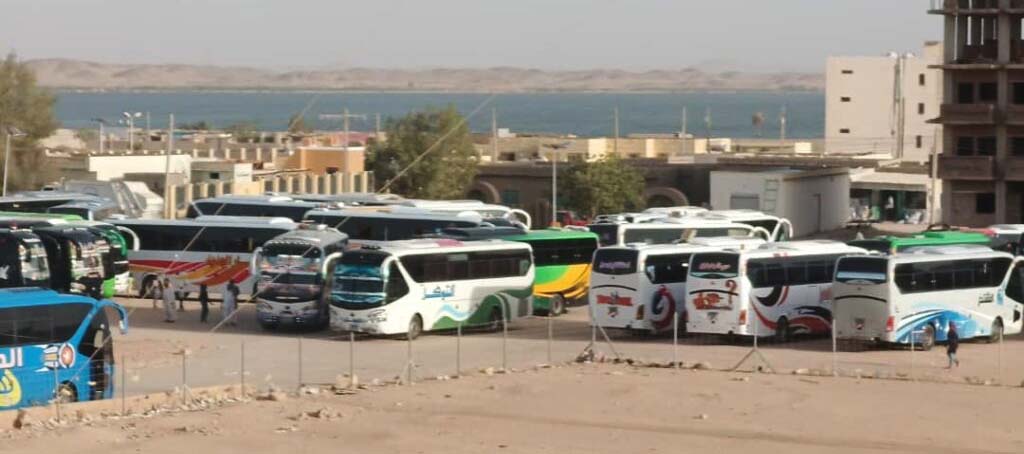Sudanese police releases visa forgers at border with Egypt

Buses backed-up at Wadi Halfa en route to the Argeen crossing (File photo: RD)
The trade in forged Egyptian visas is reportedly flourishing at the Argeen border crossing between Sudan and Egypt. Sudanese, among them many in a dire health condition, are waiting for months for an official visa. Policemen arrested two counterfeiters last week, but had to release them following intervention of high-ranking police officers.
An informed source at the Argeen crossing reported that Sudanese who fled fighting between the Sudanese Armed Forces (SAF) and Rapid Support Forces (RSF) and are searching for safety in Egypt, are waiting for months to obtain an entry visa from the Egyptian consulate department at the border.
“You cannot imagine the accumulation of people at the Argeen crossing. Among them are many sick people. Some of them have been waiting for five months for the issuance of an entry visa,” the source told Radio Dabanga yesterday.
Counterfeiters are active in the visa trade at the border. “A forged visa now costs about SDG3 million,” he said.
“The Sudanese investigations police arrested two members of these visa gangs last week. The prosecution was questioning them when influential police officers intervened and released the accused. They also removed the members of the investigations team.”
Soon after the SAF-RSF war broke out in Khartoum, on April 15 last year, Sudanese fled their homes, and many attempted to seek shelter in Egypt. However, the process proved to be extremely difficult, with reports of long waits and no access to basic amenities in Argeen. Daily, more than 20 buses arrive at the crossing, Dabanga reported on April 27. Soon, the number of buses doubled.
Sudanese women, children, and elderly still did not require a visa* to enter Egypt, men aged between 16 and 50 did. This, however, changed in June, Cairo decided to require an entry visa from all Sudanese nationals.
In September, thousands of people were still stranded in Wadi Halfa, awaiting the issuance of a visa from the Egyptian consulate. This led to many of them and new arrivals to opt for “smugglers routes” to enter Egypt. Several people have died crossing the border through smuggling, a source told Radio Dabanga in mid-January, explaining that “the trips are especially risky due to the lack of medical care”.
Egypt seems to have tightened its control of the smuggling routes, as recent social media posts with video recordings of detained Sudanese sent back to Sudan show.
* In 2004, Egypt and Sudan signed the Four Freedoms Convention, allowing free movement of citizens between both “brotherly countries”, as well as working and owning property with no special permit. Soon however, it became clear that Sudanese men between 18 and 50 years old still needed a visa to be able to enter Sudan. In 2018, the authorities in Cairo officially requested a restriction on the entry of Sudanese to Egypt. On June 10 last year, after more than 200,000 Sudanese had sought refuge in Egypt from the war, Cairo decided to oblige all Sudanese to obtain an entry visa.











 and then
and then